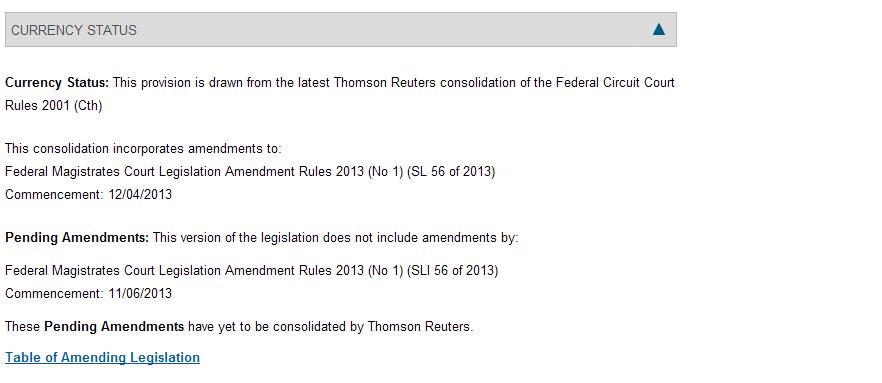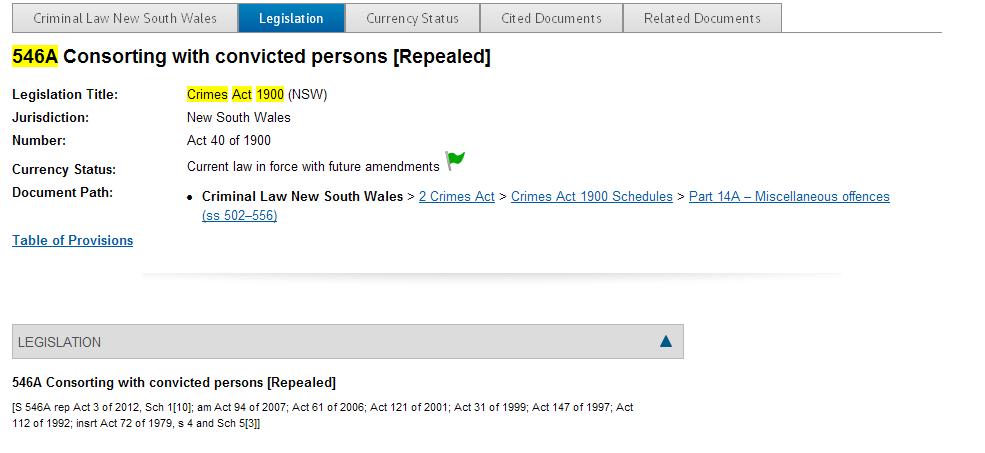Legislation Currency Flags Across AU Online Platforms
The legislation titles on Westlaw AU and Checkpoint are constantly monitored and updated by the Thomson Reuters Legislation Team to reflect current law in force.
Currency Status
The Legislation Team has dedicated editors who closely track the progress of amending Bills from introduction into Commonwealth, State and Territory Parliaments through to assent. As soon as the Team has access to the assented copy of the amending Act, a new regulation, or a proclamation of commencement, they include details of the forthcoming legislative changes and publish this information via the online currency status.
The currency status information, which sits above the full-text legislation, enables users to have quick access to details about current, pending and future amendments.
Important to note: The currency status and associated flags apply at a legislation title level only, that is, they advise on the currency of an entire Act or regulation. The flags do not indicate the currency status of an individual provision.
Yellow Flag
The yellow flag signifies there are amendments pending in respect of a principal legislation title. These amendments have commenced, but are yet to be consolidated by Thomson Reuters.
By clicking on the yellow flag, the user is taken to further details regarding these unincorporated amendments, including the amending legislation title, number and date of commencement.
Once the pending legislative amendments are consolidated into our principal legislation, we publish the current version of the legislation on Westlaw AU and Checkpoint. The yellow flag is then removed and replaced with the green flag.
Green Flag
The green flag indicates the current version of the legislation is available online, with all amendments incorporated.
When the user clicks on the green flag, they can view details of the latest legislative changes to an Act or piece of subordinate legislation, as well as upcoming amendments which commence on a future date. The future date may be defined, e.g. 01/07/2013 or undefined, i.e. to be advised (TBA). A TBA commencement will be updated as soon as an amending Act (or a part thereof) is proclaimed to commence.
Multiple Updates
A principal legislation title may be updated multiple times in respect of a single amending Act. The currency status could potentially change when an amending Act receives assent and a Part of the Act commences on the day after date of assent (2 August 2013), when another Part of the Act is proclaimed to commence on 1 November 2013 and again, when yet another Part of the Act commences on a defined future date of 1 January 2014.
History Notes
As emphasised above, the currency status and flags apply at a legislation title level, that is, they advise on the currency of an entire Act or regulation. They do not indicate the currency status of an individual provision.
A number of other key features can be used to determine the currency of a particular section, clause or rule. Firstly, detailed history notes accompany the provisions. For example, if a provision of the Crimes Act 1900 (NSW) is repealed; it will appear with a green flag at the legislation title level and a history note at the section level, e.g. S 546A rep Act 3 of 2012, Sch 1[10].
Furthermore, notations are integrated at the level of a provision heading, to indicate if a section has been repealed or has expired.




